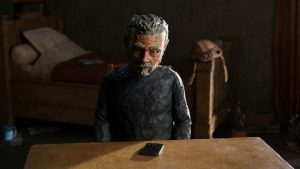QUICK SNAP: LIVE FROM TALLINN
Life doesn’t care about your plans. Alex (Jean Le Peltier) and Noemie (Lucie Debay) want a child, but have to put their lives on hold when Alex’s mother Suzanne (a superb Jo Deseure) is diagnosed with dementia. The result is a bittersweet Belgian drama-comedy that provides an unconventional yet refreshing portrait of one of the world’s most heartbreaking diseases.
Madly in Life starts with the small things, a cancelled credit card here, an unfiltered comment about sex there, before rapidly snowballing into a non-stop avalanche of issues. It soon turns out that Suzanne owes the government nearly €30,000, as she continued her job as an artistic director despite filing for a pension two years ago. Furthermore, she finds herself doing bizarre things, like getting into other people’s cars and houses. At first, it seems that she has become simply uncaring in her old age; but a trip to a professional shows that she is suffering from semantic dementia.
Directors Ann Sirot and Raphaël Balboni understand that dementia need not be expressed in clichés of mere forgetfulness — so often told in American films through unconvincing dream sequences in which people start disappearing — but can manifest itself in strange and unexpected ways.
The French title Une Vie Démente literally means “a mad life”, but functions as a clever pun on the similar word démence, which means “dementia”. This double-meaning of complex madness is not only true for Suzanne, radiantly captured by Desuere, but the young couple as well, who differ dramatically on the ways in which Suzanne should be treated. Putting their hope for a new apartment and baby on the back-burner, Madly in Life navigates a variety of escalating crises that vary from cancelling a trip on the weekend to discussing end-of-life care.
A mostly-realistic approach is complicated and enriched by a few surreal flights of fancy. For example, a repeated non-naturalist motif features the characters wearing matching clothes against a plain background, talking to a professional — whether its a pre-conception counsellor, tax accountant or a doctor — we never see. In these moments we get a sense of order that intentionally seems to jar against the chaotic world of Suzanne’s condition.
Further dislocation comes through the film’s multiple use of jump cuts. Put in places where another film would’ve let the camera roll, they create a difficult environment where resolution is not easily found. But the cast, seemingly improvising within these situations, keep an authentic and touching atmosphere throughout.
Ultimately, the film shows that there are no easy ways to cope with a loved-one losing their mind: only different degrees of less bad ones. By utilising black humour as well as heartfelt drama, Madly in Life neatly catches the highs and the lows of both life and love. An extension of several shorts the two directors have worked on together — many of which combine social reality with elements of the fable — it sees them expertly expand their pallet to a wider feature film.
Madly in LIfe plays as part of the First Feature competition at Tallinn Black Nights Film Festival, running from 13th to 29th November.










